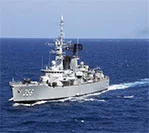POTENTIAL VOTE-WINNER: If successful, Indonesia’s new Maritime Policy stands to serve not only Indonesian, but also the region
THE newly-installed Jokowi administration has truly stepped into its shoes and seems to be making waves, literally. The latest announcement by the government that Indonesia will spend US$6 billion in infrastructural development projects intended to improve the nation’s port and maritime facilities has sent out a strong signal that the country is poised to assume its destiny as a major maritime nation in Asia. With Indroyono Soesilo as the minister in charge of the new Ministry of Maritime Affairs, the Jokowi administration has made it clear that the protection of Indonesia’s maritime territory and the improvement of its internal maritime communications is something that will be tackled with earnest.
Looking at the maritime policy from a broad macro perspective, it is clear that Jokowi envisages the Indonesian maritime zone as a key component in the maritime map of Asia. The overall aim of the policy is two-pronged: To secure the internal waterways and sea zones of Indonesia to render shipping and movement safe and efficient, and to also create a seamless and integrated communications zone where movement of goods and people from Aceh to West Papua will be as simple as land-bound terrestrial travel. Five major ports will be identified as the key transit and transport hubs across the country, and they will cover the major islands of the country including Sumatra, Java, Kalimantan, Sulawesi and West Papua. Should this policy succeed, it would connect the outer island provinces of Indonesia better than ever before, and also radically cut down cost of movement and transport, thereby lowering living costs for millions of Indonesians across the country. In short, this is a policy that may well be a potential vote-winner.
Different sectors of Indonesian society will stand to benefit from such a policy. For starters, the millions of itinerant Indonesian citizens who work and move across the outer island provinces stand to gain much from an improvement in the country’s maritime communicative infrastructure. It is clear that the maritime policy is meant to serve domestic socio-economic needs of the Indonesian people.
After all millions of Indonesians still travel across the archipelago via ferries and boats, and the issue of security and safety at sea has been a persistent concern for decades. But crucially it will also mean a cleaning up of the local cartels that have dominated and controlled local communication and transport pathways, and which have contributed to the higher cost of basic necessities like sugar, oil, gas and rice that need to be transported across the country.
Secondly, the need to secure the sea zones means that the state’s security forces will be playing a more important and visible role in the policing of the country’s maritime territory — and it has to be remembered that two-thirds of Indonesian territory happens to be maritime too. This basically translates into a more visible role to be played by the Indonesian navy, accompanied by the acquisition of better vessels to police and guard the coastlines and waters of the maritime republic.
Thirdly, this provides new business opportunities for local Indonesian developers who will, of course, to play a major role in the development of the new and better port and transport facilities that will be built over the coming years.
Thus, the public, the security forces, the navy, the developers and businesses, all stand to benefit from such a long-sighted policy.
Tubin operates with USCG Cutter Sherman during a manoeuvring event as part of the at-sea phase of exercise Cooperation Afloat Readiness and Training (Carat) recently. Carat is an annual series of bilateral maritime training exercise between the US and six Southeast Asian nations designed to build relationships and enhance the operational readiness of the participating forces. US Navy pic
It is also clear that Indonesia will have to seek external funding to succeed, and there is every likelihood that Indonesia will be part of the Asian Infrastructural Investment Bank (AIIB) project spearheaded by China.
Though there were initial concerns that Indonesia’s response to the AIIB was lukewarm when it was announced, the maritime policy that Jokowi wishes to pursue will lead the government and the country down the path of economic realism and pragmatism, and Indonesia will, in all probability, open itself to more foreign capital penetration in the near future.
Should such economic pragmatism prevail, it may also have the positive effect of damping down any potential economic-nationalist backlash that may come.
On the wider macro level, a successful maritime policy means that a large chunk of Asia’s maritime territory will be rendered safe and accessible and be integrated to the three other major maritime zones of Asia today: the South China Sea, the Pacific Ocean and the Indian Ocean.
Indonesia’s maritime policy, therefore, serves a domestic agenda as well as a wider regional agenda: by improving internal maritime communication in Indonesian waters, it is having a direct positive impact on the lives of millions of itinerant Indonesians.
And, by unifying and controlling this zone, Indonesia will be presenting the major trading powers of Asia and the rest of the world with a safe and efficient transport-communications zone where trade and movement can be conducted easily and safely.
The long-term effect of this would be Indonesia’s contribution to the development and commerce of Asia as a whole, elevating the country’s status and image in the eyes of the international community.
Article by Dr Farish Noor which appeared in New Straits Times,
10 November 2014.





